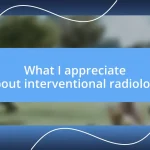Key takeaways:
- Informed consent is a comprehensive dialogue that emphasizes patient understanding, rather than merely obtaining a signature, fostering trust and empowering decision-making.
- Clear communication, utilizing plain language, and allowing time for reflection are crucial for effective consent, enhancing patient engagement and adherence to treatment plans.
- Legal implications surrounding informed consent require healthcare providers to ensure patients are well-informed about risks and options while navigating state-specific regulations.

Understanding informed consent processes
Understanding informed consent processes is essential as they form the backbone of ethical medical practice. I remember a time when I first encountered this concept during a health seminar. The speaker emphasized that informed consent isn’t just a signature on a form; it’s a conversation. Have you ever felt lost in medical jargon? It can be overwhelming when healthcare providers rush through explanations, but it’s vital for patients to truly grasp what they’re agreeing to.
Informed consent involves not only explaining the procedure but also ensuring patients understand the potential risks and benefits. I recall my own experience when I faced a decision about a medical treatment option. The doctor took the time to walk me through every detail, addressing my concerns. How do we cultivate trust if patients feel dismissed or unsure? It’s this dialogue that empowers individuals to make choices aligned with their values, reinforcing the partnership between patient and provider.
Moreover, I’ve observed that the process can vary significantly across different healthcare settings. Some places prioritize thorough discussions, while others may view consent as a mere formality. This disparity raises an important question: how can we ensure that every patient receives the same high-quality informed consent experience? It’s crucial for healthcare professionals to recognize the impact of their communication on patient understanding and comfort.

Importance of clear communication
Clear communication in the informed consent process is paramount. Without it, patients can feel more like passive participants rather than informed decision-makers. I distinctly remember sitting in a consultation where the doctor simply listed the risks, leaving me puzzled. It felt like trying to decipher a complex puzzle without all the pieces.
Effective communication fosters trust and understanding. In another instance, I was involved in a clinical trial where the research team took considerable time to discuss every aspect thoroughly. Not only did I feel respected, but I also gained confidence in my ability to make an informed choice about participating. Have you ever had an experience where open dialogue transformed your perception of a situation? Those conversations are what turn a potentially intimidating process into a collaborative journey between healthcare providers and patients.
Moreover, the impact of clear communication extends beyond individual interactions; it shapes overall healthcare experiences. When providers choose to engage in meaningful dialogue, patients are more likely to adhere to treatment plans and express their concerns. Personally, I’ve noticed that when I understand the reasoning behind a recommendation, I’m more inclined to follow through and take ownership of my health decisions. It’s these moments of clarity that truly empower patients.
| Aspect | Impact of Clear Communication |
|---|---|
| Understanding | Patients grasp the full scope of their choices. |
| Trust | Fosters a stronger patient-provider relationship. |
| Engagement | Encourages active participation in healthcare decisions. |

Key elements of informed consent
Informed consent revolves around several key elements that ensure patients are genuinely empowered to make decisions about their healthcare. From my experience, I’ve found that key components like capacity, comprehension, and voluntariness play a crucial role in this process. Every patient must have the mental capacity to understand the information provided, and it’s equally important that they comprehend it without confusion. I once sat through a discussion about a complex surgery, and it was a relief when the surgeon checked in with me to gauge my understanding—this simple act made a world of difference.
- Disclosure: Healthcare providers must present all relevant information about the procedure.
- Understanding: Patients need to demonstrate their comprehension of what’s discussed.
- Capacity: Individuals must have the mental ability to make informed decisions.
- Voluntariness: Consent should be given freely, without coercion or undue pressure.
I remember a time when I felt overwhelmed by choices regarding my treatment. The nurse not only explained the options but also encouraged me to ask questions, affirming that my comfort mattered. This approach highlighted the importance of compassion in informed consent. It’s these moments that truly shape the experience, ensuring that patients don’t feel like mere numbers on a chart but rather valued collaborators in their own care.

Challenges in obtaining consent
Obtaining consent can be fraught with challenges that often stem from the complexities of medical terminology. I remember feeling completely lost during a discussion about a new treatment plan, as the jargon used felt like a different language. When healthcare providers don’t simplify their language, patients can be left bewildered and hesitant to ask questions, fearing judgment for their lack of understanding.
Another significant hurdle is time constraints. It’s easy to overlook how rushed consultations can impact a patient’s ability to absorb information. I experienced this firsthand when a physician seemed to rush through the consent process, making me feel pressured to agree without fully grasping the implications. Have you ever felt that urgency in a medical setting? It creates a barrier that can make patients feel like they’re being pushed into decisions rather than being supported.
Moreover, emotional factors often play a crucial role, influencing a patient’s willingness to engage in the process. For instance, I once faced the daunting prospect of surgery and was overwhelmed by anxiety. During that moment, I realized that my fear overshadowed my ability to focus on the details being presented. When emotions run high, it becomes even more challenging for patients to process information critically, emphasizing the need for empathetic, patient-centered dialogues in the consent process.

Best practices for effective consent
Effective consent practices revolve around the clarity of communication. One practice I’ve found invaluable is using plain language to explain procedures. During my own treatment, I appreciated when the doctor took the time to break things down without overwhelming me with complex terms. It really helped me open up about my fears and ask the right questions. Have you ever noticed how a simple explanation can transform your understanding? It’s like turning on a light in a dim room.
Another best practice is to ensure ongoing dialogue during the consent process. I vividly recall a nurse who didn’t just hand me a form to sign but engaged me in a conversation about my treatment options. It was comforting to know I could voice my concerns and get clarifications in real time. This approach fosters trust, showing that the healthcare team values the patient’s perspective—something I believe is essential for informed decision-making.
Additionally, providing adequate time for patients to reflect on their choices can make a world of difference. In my experience, after discussing my options, I was given a few days to think it over. This allowed me to process everything adequately and come back with further questions. Have you ever had a moment to rethink a big decision, only to realize how important it was to do so? Allowing that space not only empowers patients but also enhances their sense of control in their healthcare journey.

Legal considerations in consent
Informed consent isn’t just a formality; it has legal implications that can profoundly affect both patients and healthcare providers. I once heard a heartbreaking story about a patient who, after a procedure, faced litigation because they felt they had not received proper information about potential risks. This situation highlights how important it is for healthcare teams to document consent comprehensively. Have you ever thought about how a simple signature can have such weighty consequences? It drives home the need for clear communication that stands up in a legal context.
A key aspect of legal considerations in the consent process is the age and mental capacity of the patient. I remember discussing treatment options with a friend’s teenager who was eager to jump into decisions. It became apparent that while they felt ready, the legal system still viewed them as minors without the full ability to consent. This distinction can create tension and confusion, especially when the young person feels informed yet lacks the legal standing to make those choices. How do we ensure that younger patients are empowered yet protected at the same time?
Moreover, states often have specific laws regarding consent, especially concerning advanced procedures or sensitive topics like reproductive health. I once found myself navigating a consultation where the healthcare provider had to refer to state laws about my options, which felt like a maze! I realized then that both patients and providers must be aware of these regulations to avoid pitfalls. It begs the question: how often do we consider the legal landscape while evaluating our medical choices? Understanding these laws not only helps clarify the process but also equips patients to make truly informed decisions.

Evaluating consent process effectiveness
Evaluating the effectiveness of the consent process is essential to ensuring patients truly understand their options. I fondly remember a time when my doctor asked me directly about my understanding of the risks involved in a procedure. This simple question opened a door for me to express my anxieties. Isn’t it fascinating how prompting the patient to engage can unearth critical insights?
In my experience, feedback from patients post-consent is invaluable. After a significant surgery, I was invited to a follow-up survey regarding my consent experience. Reflecting on that moment, I realized how my responses could help shape future practices. Isn’t it powerful to think that sharing one’s feelings can create a ripple effect in health care standards?
Metrics such as understanding and comfort level also play a critical role in evaluating consent. For instance, I once participated in a focus group where we discussed how well informed we felt about our treatment decisions. I noticed that many expressed frustration when they left consultations without feeling empowered. How often do we continue to let that happen? Actively measuring these aspects can lead to more meaningful consent experiences and ultimately better patient outcomes.














